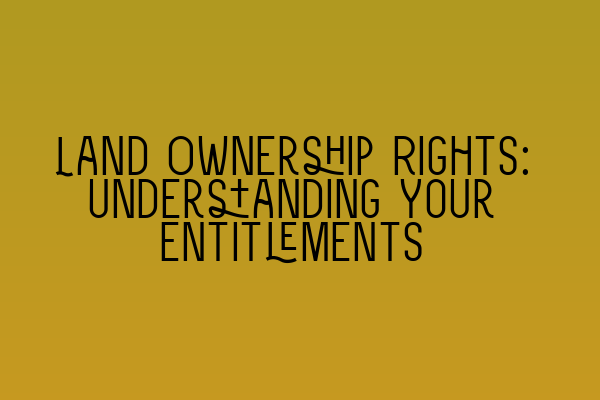Land Ownership Rights: Understanding Your Entitlements
As a property owner or aspiring property owner, understanding your land ownership rights is crucial to protecting your investments and ensuring a smooth and legally compliant process. Whether you are purchasing a new property, building on existing land, or dealing with land-related legal matters, knowing your entitlements can help you make informed decisions.
At SQE Property Law & Land Law, we specialize in providing comprehensive legal services to clients seeking assistance with land-related matters. In this blog post, we will explore the various land ownership rights you may possess and shed light on some important considerations. So, let’s dive in and broaden our understanding of land ownership rights!
1. Freehold Ownership
Freehold ownership is generally considered the highest form of land ownership. When you own the freehold, you have complete ownership rights over the land and any buildings on it. This means you have the right to use, modify, sell, or transfer the land, subject only to the applicable laws and regulations.
As a freeholder, you have the freedom to make decisions regarding the use and development of your property. However, it is essential to be aware of any restrictions, covenants, or easements that may affect your rights, as these can vary depending on the specific property and local regulations.
2. Leasehold Ownership
Leasehold ownership grants you the right to occupy and use a property for a fixed period of time under a lease agreement with the freeholder. In most cases, leasehold ownership refers to flats or apartments, where the freeholder retains ownership of the land and common areas.
As a leaseholder, you have certain entitlements outlined in the terms of your lease. This includes the right to occupy the property for the specified lease period, maintain and alter the interior of the property (subject to any restrictions in the lease), and benefit from any shared facilities or services. It is crucial to carefully review the terms of your lease and understand any leasehold obligations or restrictions before entering into an agreement.
3. Easements and Rights of Way
Easements and rights of way are legal rights that grant certain access or use entitlements to individuals or properties. These rights can be created by law, through agreements, or established over time through historical use.
Common examples of easements include rights of way, which allow individuals to pass over a property owned by someone else, and rights to access utility services or maintain structures that are essential for the use and enjoyment of a neighboring property.
Understanding the existence and implications of easements and rights of way is essential when dealing with property transactions or disputes. It is advisable to conduct a thorough search and investigation to determine any easements that may exist on a property and their impact on your land ownership rights.
4. Restrictive Covenants
Restrictive covenants are legal obligations or restrictions placed on the use and development of a property. These covenants are typically created when a property is sold and are binding on subsequent owners.
Restrictive covenants can cover a wide range of limitations, including restrictions on the type of structures that can be built, the use of a property for specific purposes, or aesthetic requirements. It is important to carefully review any restrictive covenants associated with a property before purchasing or making significant alterations to it.
5. Adverse Possession
Adverse possession, also known as squatter’s rights, is a legal principle that allows someone who has occupied and treated a piece of land as their own for a certain period of time to claim ownership. The specific requirements and time periods for adverse possession vary depending on the jurisdiction, but the general idea is to prevent land from being left abandoned and unused.
It is crucial to be aware of adverse possession laws in your jurisdiction to protect your land ownership rights. Conducting regular inspections and taking appropriate legal action if someone is unlawfully occupying your property can help prevent adverse possession claims.
In conclusion, understanding your land ownership rights is vital to protect your property investments and ensure a smooth legal process. Whether you are a freeholder or a leaseholder, it is important to familiarize yourself with the specific entitlements and obligations associated with your property.
At SQE Property Law & Land Law, we are here to help you navigate the complexities of property law and provide expert advice tailored to your needs. For further information or legal assistance, please do not hesitate to contact us.
Related Articles:
– Prepare yourself for the upcoming SQE exams by practicing with our SQE 1 Practice Exam Questions.
– Boost your confidence and test your knowledge with our SQE 1 Practice Mocks FLK1 FLK2.
– Explore our comprehensive SQE 2 Preparation Courses to ensure you’re fully prepared for the exam.
– Get ready for the SQE 1 exam with our highly recommended SQE 1 Preparation Courses.
– Stay up-to-date with the latest SRA SQE Exam Dates to plan your study schedule effectively.
Disclaimer: The information provided in this blog post is for general informational purposes only and should not be considered legal advice. Always consult with a qualified professional regarding your specific situation.
